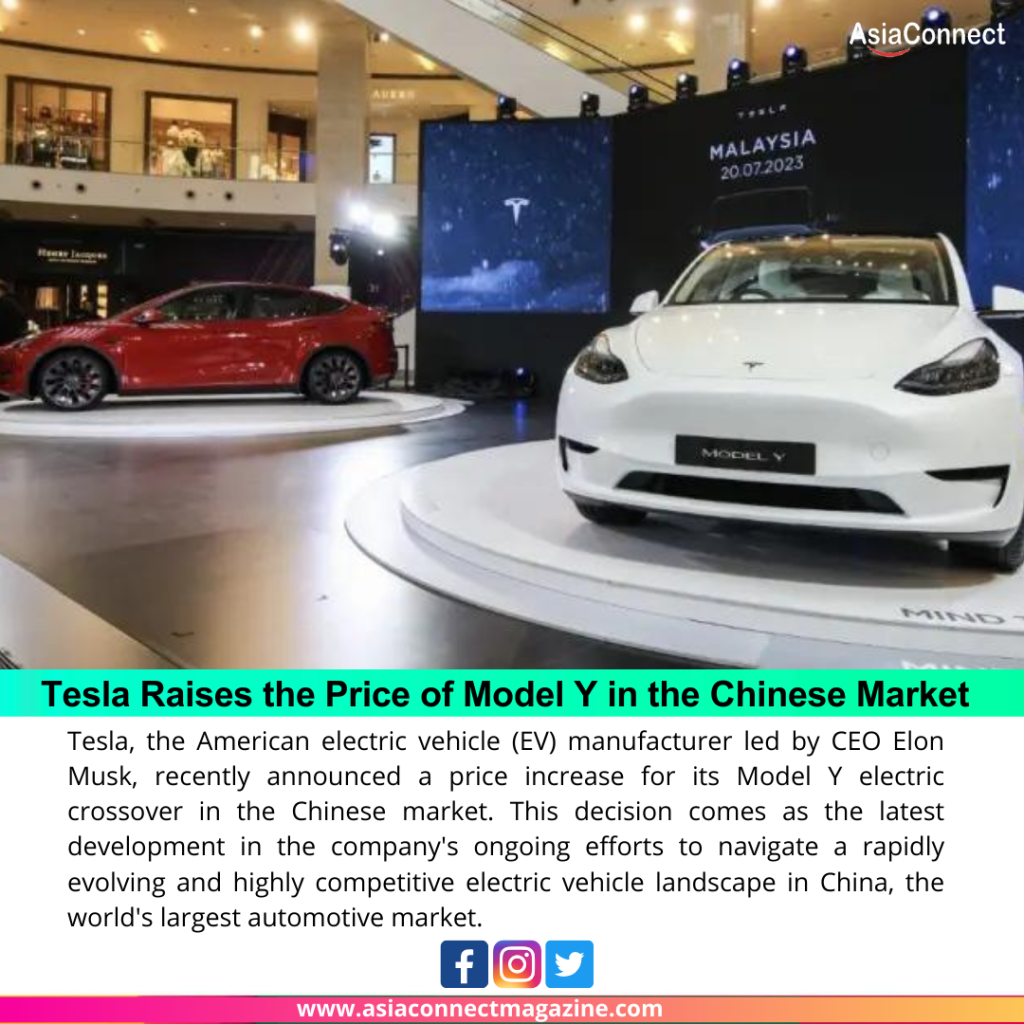
Tesla Raises the Price of Model Y in the Chinese Market
Tesla, the American electric vehicle (EV) manufacturer led by CEO Elon Musk, recently announced a price increase for its Model Y electric crossover in the Chinese market. This decision comes as the latest development in the company’s ongoing efforts to navigate a rapidly evolving and highly competitive electric vehicle landscape in China, the world’s largest automotive market.
Tesla’s Growing Presence in China
Tesla has been making significant strides in the Chinese market over the past few years. It began delivering locally made Model 3 vehicles from its Gigafactory in Shanghai in early 2020. This strategic move allowed Tesla to reduce production costs, minimize delivery times, and cater more effectively to Chinese customers.
The Model 3’s success in China, combined with the growing demand for electric vehicles, encouraged Tesla to continue its expansion efforts. The Model Y, a compact electric crossover SUV, was introduced to the Chinese market with the expectation of further increasing Tesla’s footprint and capturing market share.
Price Hike Rationale
The decision to raise the price of the Model Y in China may seem counterintuitive, as Tesla had previously reduced prices on some of its models to remain competitive in the Chinese market. However, several factors could explain the company’s rationale for this move.
- Materials Cost: Global supply chain disruptions and rising raw material costs have affected many industries, including automotive manufacturing. It’s possible that Tesla is adjusting prices to reflect the increased expenses related to sourcing materials for the Model Y in China.
- Exchange Rate Fluctuations: Exchange rate fluctuations can significantly impact a company’s profitability in international markets. If the value of the U.S. dollar has risen relative to the Chinese yuan, it could lead to higher costs for Tesla, which could, in turn, be reflected in the Model Y’s price.
- Market Positioning: Tesla may be repositioning the Model Y as a more premium offering in China. By raising the price, the company could be aiming to distinguish the Model Y from competitors and position it as a higher-end electric SUV with enhanced features and performance.
- Increased Demand: If demand for the Model Y remains strong, Tesla may adjust prices accordingly. Higher prices can help manage demand and ensure that Tesla can deliver vehicles to customers in a timely manner.
Market Implications
The price increase for the Model Y in China is likely to have several implications for both Tesla and the Chinese EV market.
- Profit Margins: Higher prices can lead to improved profit margins for Tesla in China, potentially boosting its overall financial performance in the region.
- Competitive Landscape: The move could influence the competitive landscape of the Chinese EV market. If Tesla positions the Model Y as a premium product, it may impact how other automakers in the region price their electric SUVs.
- Customer Response: Customer response to the price increase will be crucial. If the Model Y remains in high demand despite the higher price, it could demonstrate the brand’s strong appeal and market position.
- Continued Expansion: Tesla’s ability to succeed in the Chinese market is closely tied to its capacity to expand its manufacturing capabilities and produce vehicles in China efficiently. A price increase could potentially support further investments in local production.
The Chinese EV Market
China is a vital market for electric vehicles, with numerous local and international manufacturers competing for market share. The Chinese government has been actively promoting electric vehicles to reduce air pollution and decrease the country’s carbon footprint. Consequently, the Chinese market offers substantial growth potential for Tesla and other EV manufacturers.
As the Chinese government continues to provide incentives for EV adoption and enforces stricter emissions standards, the demand for electric vehicles is expected to increase further. Tesla’s efforts to expand and adapt to this evolving market are in line with the broader trends in China’s automotive industry.
In conclusion, Tesla’s decision to raise the price of the Model Y in the Chinese market reflects the dynamic nature of the global automotive industry. By adjusting pricing, Tesla aims to navigate the challenges posed by rising costs, exchange rate fluctuations, and increased demand. This move also demonstrates Tesla’s commitment to establishing a strong presence in the highly competitive Chinese EV market, where it competes with both local and international automakers for a share of the growing electric vehicle segment. The success of this strategy will depend on how Chinese consumers respond and the competitive landscape’s evolution in the coming months and years.




